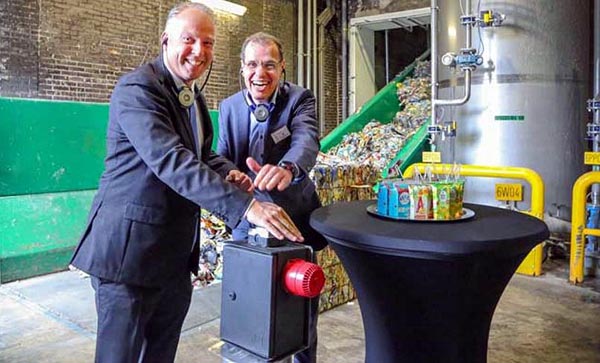Van Houtum Has Festive Opening Ceremony for Omnipulper
![]() Print this Article | Send to Colleague
Print this Article | Send to Colleague
Late this past month, Van Houtum, Netherlands, described how Remco Dijkstra, a member of parliament in the Dutch Lower House, opened the company's new state-of-the-art production line - the omnivorous Omnipulper. This production line uses beverage cartons as a raw material for producing toilet paper and paper towels.
"This is a major strategic investment which anticipates future scarcity of recovered paper as a raw material for our production," explained Managing Director Bas Gehlen.

Pictured above: Dutch MP Remco Dijkstra officially opened the new production line - the omnivorous Omnipulper - on April 25.
"I have the greatest respect for the people at Van Houtum. The company is the first Dutch paper producer to succeed in using beverage cartons as a raw material for producing toilet paper and paper towels. Van Houtum has taken a bold step in initiating this project and overcoming the technical challenges. Thanks to good cooperation in the value chain, they have succeeded in closing the recycling loop," said MP Remco Dijkstra.
As an MP Dijkstra strongly supports collecting and recycling beverage cartons. His motion to encourage as many municipalities as possible to set up and participate in collection systems was adopted by a large majority in the Dutch Lower House at the end of 2014.
"The result to date is that 329 municipalities collect beverage cartons for recycling," said Dijkstra. "That is 84% of the total of 390 Dutch municipalities - an unqualified success in other words. It is important to ensure that municipalities receive financial compensation from the Packaging Waste Fund (Afvalfonds Verpakkingen) for setting up the collection structure and arranging disposal of the waste. This technical innovation once again demonstrates Van Houtum's progressive approach as a company."
The search for alternative raw materials led the company to beverage cartons and elephant grass as possible candidates.
"However designing a process for removing food residues from the beverage cartons and also cleaning the recovered plastic and aluminium to a standard suitable for re-use was a complex technical challenge. It took us two years," said Gehlen.
The material preparation line was developed under the supervision of Senior Process Technologist Eric van Hoof in close collaboration with SUEZ Nederland and Stichting Hedra. SUEZ Nederland has constructed a large sorting system to separate beverage cartons from recovered plastic waste while Stichting Hedra, the industry association for the beverage carton producers, has set up a national campaign aimed at motivating the general public to collect beverage cartons for recycling.
"We can only create a circular economy if all the partners in the value chain cooperate with each other," said Gehlen.
As they left the opening ceremony, all the guests were given a four-pack of toilet paper. The paper for this limited edition is made from 33% beverage cartons and 67% normally recovered paper.


